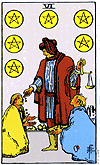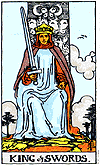Advice and Emotions from the Minor Arcana
The Major Arcana, being the more generic archetypes of the Tarot deck and
relating more readily to the greater progression of life, can answer all
kinds of questions and are appropriate in almost any spread position, from
"possible future" to "client's feelings" to "suggested advice". The Minor
Arcana, on the other hand, don't seem to answer some of these questions as
easily. While the pips can show future situations and the court cards can
represent people, advice and emotions are harder to find within the suit
cards. But these things can be found if you know how and where to look.
 Say the Rider-Waite Six of Pentacles has been drawn in a reading, and placed
in the "client's feelings" position of some arbitrary spread. The standard
divinatory meanings do not help us here, because they usually refer to a
gift or to material gain, which is an event but not an emotion. At first
glance it would appear that the card cannot convey any useful information
because it is "out of its element", so to speak. However, a perceptive
readers will see that this is not the case. There are many ways to obtain
information about emotions from even the most inscrutable cards.
Say the Rider-Waite Six of Pentacles has been drawn in a reading, and placed
in the "client's feelings" position of some arbitrary spread. The standard
divinatory meanings do not help us here, because they usually refer to a
gift or to material gain, which is an event but not an emotion. At first
glance it would appear that the card cannot convey any useful information
because it is "out of its element", so to speak. However, a perceptive
readers will see that this is not the case. There are many ways to obtain
information about emotions from even the most inscrutable cards.
One way, if you use a deck with illustrated minors, is to imagine yourself
of a character the situation portrayed on the card, and then ask how you
would feel about your role in the scene. If you were the man giving coins
to the beggar, how would you feel? Would you feel good and kind because you
are giving to someone in need, or would you feel bad because you don't have
enough to give to everyone? What if you were the beggar getting the coins?
What if you were the beggar getting nothing? The answer you receive will
tell you the emotions embodied by the card.
One point I wish to make clear is that, when doing readings for others, you
must ask "What would I feel" and not "What would the subject of the reading
feel?" Use the feeling you know you would experience, not the feeling you
believe someone else would experience. If you try to imagine what someone
else would feel in a given situation, then you are doing nothing more than
guessing, and it makes your problem worse. The Tarot is your personal tool
for guidance, and your interpretations must be personal, remaining constant
from client to client but with enough flexibility to cover all cases.
The emotional connotations of the Minor Arcana are rarely spelled out in
textbooks and beginner's guides, and even in this book you will not be able
to find them written out in lists or tables. This is because events and
situations are objective and do not really depend on one's point of view,
but emotions are subjective. While everyone can see poverty in the Five of
Pentacles, not everyone sees sadness. Some readers may see opportunity,
because in this situation, there is nowhere to go but up. Others, who have
been poor all their lives, may see a state that, while difficult, is not
something that threatens to destroy them.
It is more difficult, but court cards can portray emotions too. Most court
cards are defined by a few basic character traits. While not emotions in
the strictest sense of the word, these traits will determine the nature of
the emotional reactions experienced by persons possessing them. One way to
find emotions in court cards is, as before, to place yourself in the card.
But now instead of reacting to a situation in the card's image, react to
the question being asked - but react as the person on the card would react,
according to the character traits you have studied. Study your reactions
and find the associated emotions.
 This might be difficult for those with little experience in role-playing,
so I will offer examples. Say you draw a King of Swords in the "client's
feelings" position during a reading for a client who thinks her husband is
cheating on her. Some character traits for this court card are "ethical",
"fair", "intelligent". (Yours may vary, of course, but for our purposes,
let's use mine.) Imagine what this King would do if he was told his wife
was having an affair. He'd want proof before judging her. This implies
that the client may have some doubts about the truth of the situation, and
does not know how to proceed because she does not have the whole story.
This might be difficult for those with little experience in role-playing,
so I will offer examples. Say you draw a King of Swords in the "client's
feelings" position during a reading for a client who thinks her husband is
cheating on her. Some character traits for this court card are "ethical",
"fair", "intelligent". (Yours may vary, of course, but for our purposes,
let's use mine.) Imagine what this King would do if he was told his wife
was having an affair. He'd want proof before judging her. This implies
that the client may have some doubts about the truth of the situation, and
does not know how to proceed because she does not have the whole story.
Different situations, or course, will produce different emotions. A King of
Swords in a reading for a woman who knew her husband was being unfaithful
(that is, the client already has tangible proof) would be a sign of great
anger and hostility. A King of Swords does not like it when the laws are
violated, and will desire punishment or retribution. This is obviously not
the same emotional reaction as before, but it is the same person, with the
same character traits. Only the specific situation changes. Similarly,
the court cards can portray a variety of emotions depending on the specific
nature of the question being asked.
The court cards can be very helpful when they appear in "advice" positions.
Think about what advice the client would get if they went straight to the
person portrayed on the court card, instead of coming to you. The King of
Swords would advise caution in most situations, whereas a Knight of Swords
would likely suggest quick action, for example. A thorough understanding
of the court cards' character traits will allow you to comprehend how they
think and act. And, in turn, you will understand how to interprte these
thoughts and actions in the context of a reading.
What do you do if a suit card like the Five of Pentacles shows up in the
"advice" position? In this situation, instead of imagining that you are
in the shoes of the people on the card, imagine that you are giving advice
to the characters in the image. So when you see the Five of Pentacles, you
might suggest to the characters - and therefore to the client - that help
is near, and that they can find it if they stop worrying about their own
problems and start looking for a way out of them. Or you might suggest to
them that they can stay warm if they stick together; thus the advice to the
client might be to seek help from someone close to them.
Some of the Minor Arcana are admittedly dificult to interpret in this way.
Here I am thinking of the Eight of Wands and Three of Swords, which feature
no real characters to act out, or to talk to. If your deck does not have
illustrated suit cards then this approach will not work at all. But, as I
have said many times, my approach is not the only way. Advice and emotions
from the Minor Arcana can be derived in all sorts of ways, which can be
uncovered by the determined reader. Hopefully the process I have outlined
here will give you some direction and allow you to find your own methods.
Copyright 2000 James Rioux
 Say the Rider-Waite Six of Pentacles has been drawn in a reading, and placed
in the "client's feelings" position of some arbitrary spread. The standard
divinatory meanings do not help us here, because they usually refer to a
gift or to material gain, which is an event but not an emotion. At first
glance it would appear that the card cannot convey any useful information
because it is "out of its element", so to speak. However, a perceptive
readers will see that this is not the case. There are many ways to obtain
information about emotions from even the most inscrutable cards.
Say the Rider-Waite Six of Pentacles has been drawn in a reading, and placed
in the "client's feelings" position of some arbitrary spread. The standard
divinatory meanings do not help us here, because they usually refer to a
gift or to material gain, which is an event but not an emotion. At first
glance it would appear that the card cannot convey any useful information
because it is "out of its element", so to speak. However, a perceptive
readers will see that this is not the case. There are many ways to obtain
information about emotions from even the most inscrutable cards.
 This might be difficult for those with little experience in role-playing,
so I will offer examples. Say you draw a King of Swords in the "client's
feelings" position during a reading for a client who thinks her husband is
cheating on her. Some character traits for this court card are "ethical",
"fair", "intelligent". (Yours may vary, of course, but for our purposes,
let's use mine.) Imagine what this King would do if he was told his wife
was having an affair. He'd want proof before judging her. This implies
that the client may have some doubts about the truth of the situation, and
does not know how to proceed because she does not have the whole story.
This might be difficult for those with little experience in role-playing,
so I will offer examples. Say you draw a King of Swords in the "client's
feelings" position during a reading for a client who thinks her husband is
cheating on her. Some character traits for this court card are "ethical",
"fair", "intelligent". (Yours may vary, of course, but for our purposes,
let's use mine.) Imagine what this King would do if he was told his wife
was having an affair. He'd want proof before judging her. This implies
that the client may have some doubts about the truth of the situation, and
does not know how to proceed because she does not have the whole story.